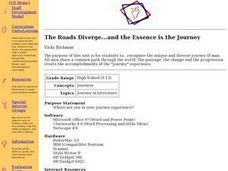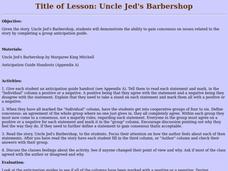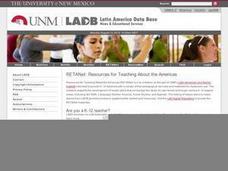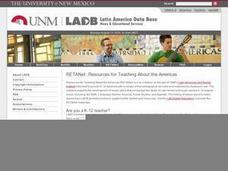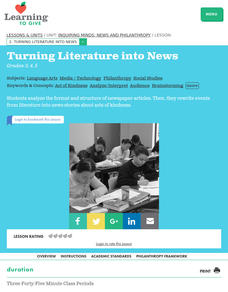Curated OER
The Three Bears
Second graders are comparing and contrasting two stories, The Three Bears and Abuelo and the Three Bears. The first story is the traditional fairy tale. The second one is a different version of the story with some Spanish words and phrases.
Curated OER
Everyday Heroes
Students research how Ernie Pyle's descriptive narratives and "every man's" perspective of the war allow them to examine personal traits such as courage and heroism. The lesson can be extended to include more examples to teach character...
Curated OER
The Roads Diverge...and the Essence is the Journey
Students examine the diverse and unique journeys of men. After reading various pieces of literature, they identify any rites of passage or change in the characters. They write in their reflective journals sharing their thoughts on the...
Curated OER
Grandma Tells A Story
Students read a story with the teacher to reflect upon their own family history. The application of the story is when children create their own family tree and complete the questionaire.
Curated OER
Uncle Jed's Barbershop
Students are read the book "Uncle Jed's Barbershop". After the story, they complete an anticipation guide to label each statement as either a positive or a negative. In groups, they try to come to a concensus on each statement. They...
Curated OER
Fools Following the Fools
High schoolers read "The Winter's Tale" in Foole Upon Foole to determine the qualities the author used for a fool. Students role play the character to determine how volume affects the way a character is perceived. High schoolers...
Curated OER
Stories
Students read and discuss a story in Spanish. Creating a poster board, they write the names of the characters in the story. In pairs, they write sentences about their characters they have chosen to role play. They practice and perform...
Curated OER
Caesar
Students examine patterns of imagery in Caesar by using online resources. Students compare the patterns they see to those they've found in other Shakespeare plays. Then students draw conclusions about why Shakespeare might have used the...
Curated OER
Richard II
Learners examine patterns of imagery in Richard II by using online resources. Students compare the patterns they see to those they've found in other Shakespeare plays. Then learners draw conclusions about why Shakespeare might have used...
Curated OER
King Lear
Students examine patterns of imagery in King Lear by using online resources. Students compare the patterns they see to those they've found in other Shakespeare plays. Then students draw conclusions about why Shakespeare might have used...
Curated OER
Hamlet
Young scholars examine patterns of imagery in Hamlet by using online resources. Students compare the patterns they see to those they've found in other Shakespeare plays. Then young scholars draw conclusions about why Shakespeare might...
Curated OER
Mapas Bailados: Creating Visual Representations of Dances Using Maps
Third graders listen to "Frank the Monster..." and discuss the dance map on the inside cover of the book. They create their own dance map using sentence strips to record the types of movement.
Curated OER
Eureka!
Middle schoolers chose a book they are interested in. They are given specific instructions to complete a project. They are tested on the book's material.
Curated OER
American Literature: An Oblique Introduction
Eleventh graders research journals and periodicals of different accounts of Columbus and Latin America. They examine indigenous civilizations and design their own curriculum based on the information they have gathered.
Curated OER
Leyendas and Children's Literature
Students in high school read books to elementary students. They also examine cultural writings and legends from Latin America. They complete projects over the information they have found and give one of them to the elementary student.
Curated OER
Beginning, Middle and Ending
First graders identify the beginning, middle and ending of the story "Where the Wild Things Are". They also listen to different songs and identify the beginning, middle and ending. They create their own story and identify the different...
Curated OER
Using Children's Literature to Teach Writing: Oh, Tucker!
Students are read the book "Oh, Tucker". They write a paper about the positive and negative aspects of having a dog as a pet. They use a graphic organizer to organize their thoughts and they edit them the next day in class.
Curated OER
Exploring the Neighborhood -- Literature Jigsaw
Students compare and contrast domesticated animals and wild animals. They identify plants and animals that have adapted to different habitats. They discover it is everyone's responsibility to protect the environment.
Curated OER
"I" On Philanthropy
Young scholars read children's literature and listen to song lyrics to identify acts of philanthropy. They discuss how one's identity can be shaped by helping others. They also focus on the non-profit sector.
Curated OER
Look at Philanthropy in Children's Literature
Students listen to stories about different philanthropic acts. They work together in groups to create a list of the needs of their community. They chose a service project which could be completed by their class.
Curated OER
Philanthropy, Literature and You
Pupils identify philanthropic acts in the novel "To Kill A Mockingbird". They create a box of items that were found in the tree from the novel as well. They write journal reflections based on philanthropic acts they have done in their...
Curated OER
The Name Game
Students identify acts of philanthropy in different works of literature. They idenify and illustrate examples in colonial America. They also read "Miss Rumphius" on how they can make the world a more beautiful place.
Curated OER
Turning Literature into News
Students analyze the format and structure of various newspaper articles. Then, they rewrite events from literature into news stories about acts of kindness.
Curated OER
Spanish and New Standards
Students, at the end of the lesson analizar una lectura period??stica.




